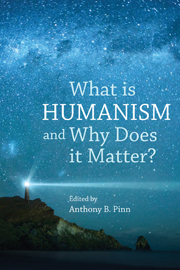Book contents
- Frontmatter
- Contents
- Preface
- Acknowledgments
- Part I What Is Humanism?
- Part II Why Doest Humanism Matter?
- Part III What Do We Do With Humanism?
- 6 Beyond Kumbaya: Culturally Relevant Humanism in an Age of “Posts”
- 7 Humanism and the Bib Problem
- 8 Growing Humanism in a Faith-Dominated Society
- Appendix: Humanist Manifestos
- Notes
- Select Bibliography
- Contributors
- Index
6 - Beyond Kumbaya: Culturally Relevant Humanism in an Age of “Posts”
from Part III - What Do We Do With Humanism?
- Frontmatter
- Contents
- Preface
- Acknowledgments
- Part I What Is Humanism?
- Part II Why Doest Humanism Matter?
- Part III What Do We Do With Humanism?
- 6 Beyond Kumbaya: Culturally Relevant Humanism in an Age of “Posts”
- 7 Humanism and the Bib Problem
- 8 Growing Humanism in a Faith-Dominated Society
- Appendix: Humanist Manifestos
- Notes
- Select Bibliography
- Contributors
- Index
Summary
In 1781, black and brown women and men founded the city of Los Angeles. In this so-called city without a history, legend has it that undocumented Anglos were the real “o.g. illegals.” A few years before, a “new” revolution in what it meant to be human unfolded on the opposite shore in the British colonies. My students know the “romance” of the American Revolution but not the secret of Los Angeles. In the prison house of textbook history, they know each other as enslaved “niggers” and wetback interlopers. Growing up in the same neighborhoods, elbow to elbow, cheek by jowl, they are taught to believe that black and Latino culture can be distilled down to media stereotypes: get rich or die tryin, hip hop and ghetto dysfunction; big Catholic families and “job-stealing illegals.” As kindergartners they were taught to cite the pledge of allegiance as sacred chapter and verse, hand solemnly over heart, in homage to royal theft. Founding myths of heroic white men bootstrapping to liberty are intimately bound to their imagination of the classroom, to its rhythm of shrill discipline and stench of ground chalk, to a regime of time in which white supremacy and narratives of progress are the currency of American faith. Over the past few decades, progressive education reform activists have reshaped the dialogue about the so-called achievement gap in public schools.
- Type
- Chapter
- Information
- What is Humanism, and Why Does it Matter? , pp. 94 - 107Publisher: Acumen PublishingPrint publication year: 2013

